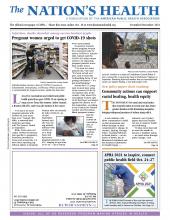
Among the data All of Us is collecting on diverse groups is how the pandemic is impacting people’s health and daily lives.
Photo by SDI Productions, courtesy iStockphoto
Cheryl Clark, MD, ScD, is principal investigator of community and participant engagement for the New England hub of the All of Us Research Program. Clark is an associate physician at Brigham and Women’s Hospital and assistant professor of medicine at Harvard Medical School. She joined All of Us in its pre-launch stages to help design strategies for meaningful relationships with program participants.
How does the All of Us program benefit people and communities of color in particular?
I have not seen a program that has had this scale and scope of work around precision medicine that also has an equity focus. It’s that commitment to diverse populations that made me want to participate.
We’re now coming up on two years of the COVID-19 pandemic and very public murders of African Americans that have raised awareness of the way that science, health and public health don’t have the information that we need to understand how both disease processes as well as prevention happen in diverse groups.
We have enrolled more than 400,000 out of a million participants in the program. Fifty percent of those come from a race or ethnic category that traditionally hasn’t been included in health research. Being able to have the information — to have a deep investment in collecting the data that we need in diverse populations — is an important stepping stone to being able to ask the kinds of questions that matter to diverse groups.
In addition to having participants who are from all walks of life, we also prioritize investigators and scientists who are from all walks of life. We have seen how important it is to have a diverse group of scientists who are asking questions from their own lived experiences and perspective. If we are hoping to move forward and advance health equity research, we have to have diverse investigators as well as diverse participants. And it’s been exciting to see the strategies All of Us is using to do that.
How does the All of Us benefit people who live in New England?
When you’re doing research with people and with communities, it’s important to make sure that those communities benefit from the work that you’re doing. We just published a paper in the journal Ethnicity and Disease that talked about our outreach during COVID. It’s hard to remember this, but back in March 2020, none of us knew anything. It was a confusing time. There was a lot of disinformation, the country had just shut down, and a lot of people were hungry and they didn’t know what’s going on. At that point in New England, we had enrolled 20,000 people.
We called all 20,000 of them to check in and make sure that they were doing OK and to provide them with information about COVID-19 from the CDC, with information on local resources so that they could find their local food pantries if they were hungry, and other information about social services.
Why is it important for the program to be embedded in communities?
We have to make sure that as we conduct research, we also care about the communities in which we are conducting research.
That is why All Of Us doesn’t talk about research participants, we talk about our partners. And that’s the kind of values that we try to put forward in the way we work.
What would you tell someone who wants to join All of Us?
Zora Neale Hurston once said that “Research is formalized curiosity. It is poking and prying with a purpose.” And I don’t think that we get very far unless we have full participation, we need everyone’s good thinking. We need everyone to be curious about what can make our health better, what can make our society better.
We really need everyone to step forward and to contribute their thinking contribute their information so that we can make sense of this and move health and public health forward. And I can’t think of a more critical time than now for us to come together and do that.
— Interview conducted, condensed and edited by Aaron Warnick
- Copyright The Nation’s Health, American Public Health Association









